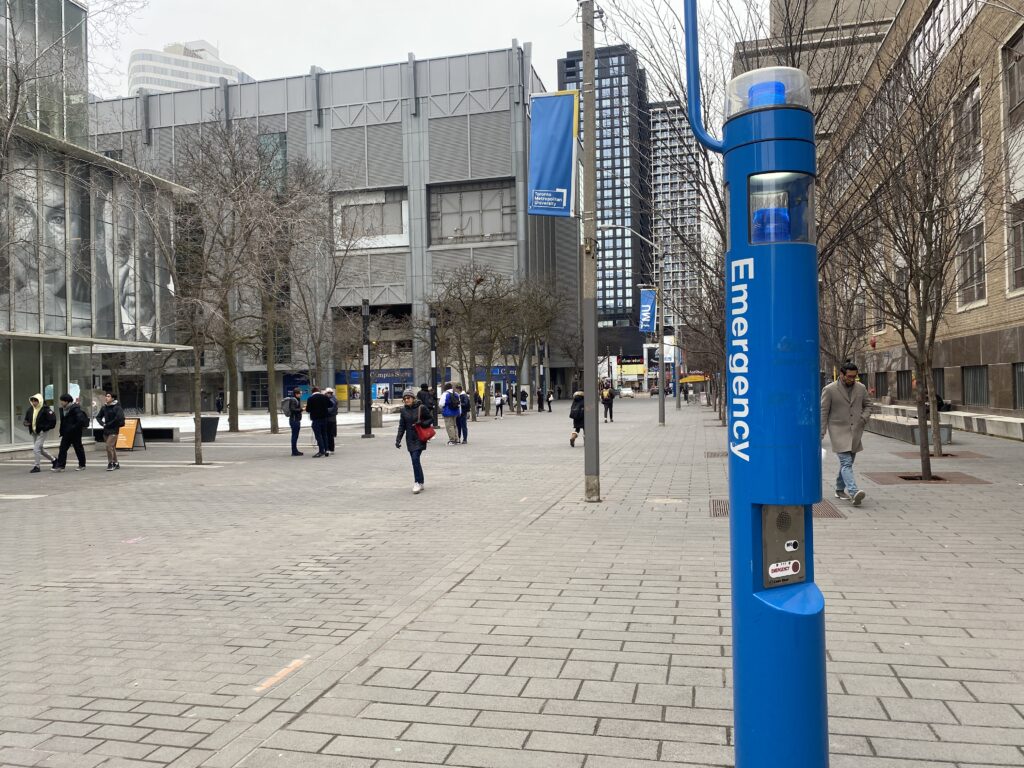
Listen to the story here:
A Toronto Metropolitan University (TMU) pilot project designed to reduce crime and promote a safe, welcoming downtown environment through community engagement had more than 2,700 interactions in and around campus in the fall semester.
The Strategic Outreach and Response Team (SORT), led by TMU’s Community Safety and Security service, operates in partnership with external community agencies like Dixon Hall Neighbourhood Services. The not-for-profit organization provides housing, food and harm reduction support in the downtown east area.
“We work together with [TMU] to respond to overdoses [and] to do wellness checks on folks that may be experiencing homelessness or are street-involved on campus,” said Melanie Smith, the community engagement program manager at Dixon Hall. Smith works closely with people living in Dixon Hall’s shelters and supportive housing.
SORT members also connect with unhoused individuals to offer services and support, engage in safety outreach walks and training seminars, and foster one-on-one conversations with community members about their personal safety.
One of Dixon Hall’s shelters, a hotel at 65 Dundas St. E., sits right across the street from TMU and houses 280 individuals. Smith says by combining forces, Dixon Hall and TMU security are able to cover more ground when patrolling the community. They also come together to de-escalate situations and respond to distress calls from people who need help.
“In more of those emergency situations, we work together to essentially save a life and to make folks that are in the immediate vicinity feel more safe when something scary is happening,” Smith said.
While TMU increased the number of security officers on campus in response to safety issues last year, Community Safety and Security said via email that they don’t believe solely heightening security presence will solve issues related to public safety.
Andrew Hathaway, an associate professor at the University of Guelph and an expert on harm reduction, says TMU’s comprehensive approach to safety makes sense given the school’s unique location — where the campus and the rest of the downtown core often blend together.
“That certainly introduced new challenges, so it doesn’t surprise me to be hearing TMU is facing the kind of challenges that most campuses don’t face and needs to innovate and adapt in this way.”
Hathaway added that a lot of the issues faced by unhoused community members are mental health related.
“There are a lot of perceptions and misperceptions of [the unhoused] population that require a very sensitive approach,” he said.
According to a 2017 Safe and Inclusive Streets Strategy Report by Downtown Yonge BIA, another of SORT’s partners, 45 per cent of the police calls in the downtown area were related to mental health.
SORT members will often take a less abrasive tactic to safety by “augmenting the work of [their] uniformed security guards by responding to calls for service where a plain clothes team member can provide a softer approach to certain needs,” Community Safety and Security said in their email. “Each engagement requires a tailored approach and as such, the approach and activities for each engagement are unique to each other.”
While the SORT project works to create a safer neighbourhood for both students and residents, Smith said there is still work to be done related to community cohesion.
“[We need] less of the othering of people,” Smith said. “We are all part of the same community, we are all neighbours, so how do we share space together? How do we engage with each other in positive ways? How do we make everyone feel like they’re part of the neighbourhood?“
As for the future of the pilot project, Community Safety and Security said the team is constantly looking for new ways to improve upon their approach and connect with people in need.
Managing Editor, On The Record, Winter 2023

